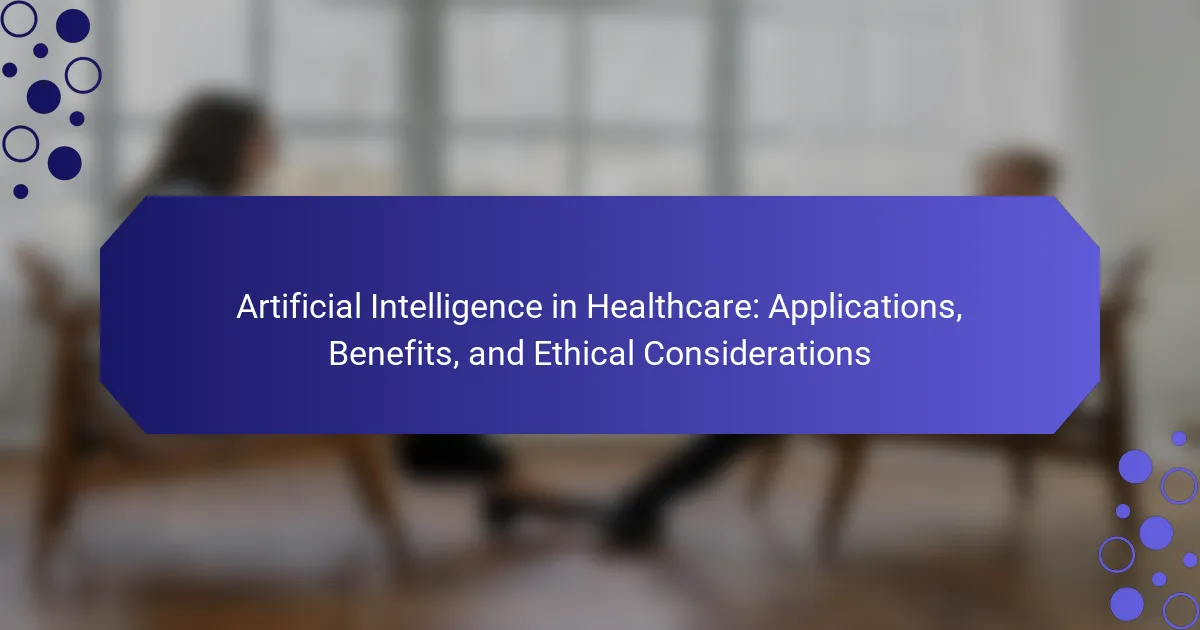Artificial intelligence in healthcare significantly enhances diagnostic accuracy, patient care, and operational efficiency. Key applications include early disease detection through imaging analysis and predictive analytics for patient needs. However, this integration raises ethical concerns regarding data privacy and algorithmic bias. Leading organizations like Google Health and IBM Watson Health are at the forefront of these innovations, navigating both the benefits and challenges of AI in the medical field.
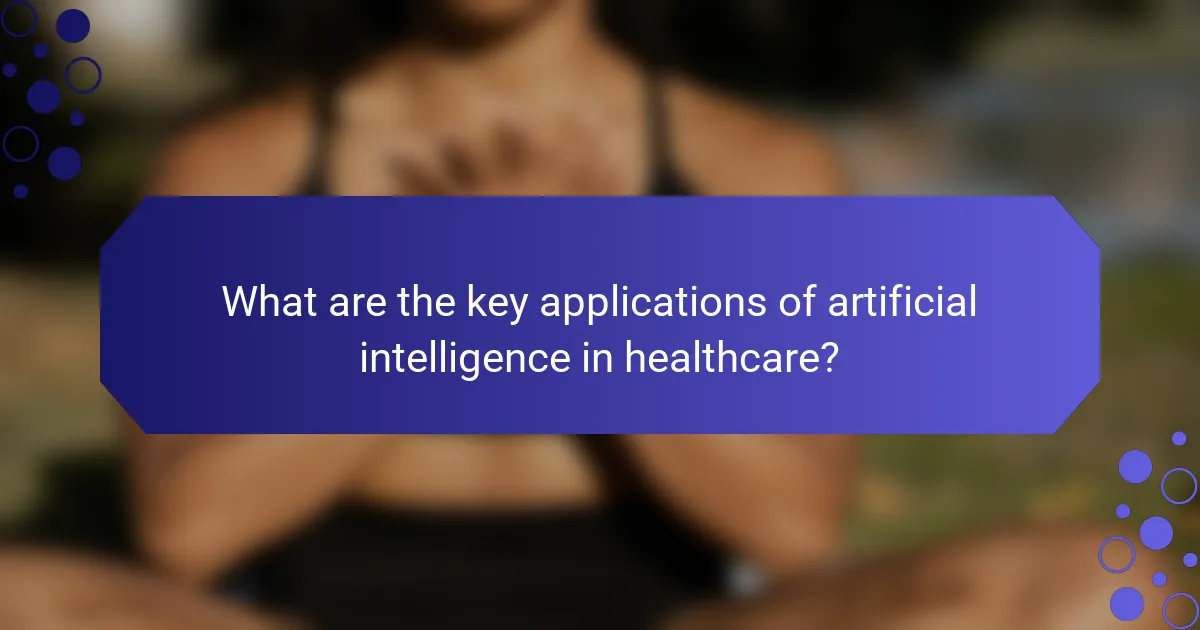
What are the key applications of artificial intelligence in healthcare?
Artificial intelligence in healthcare has key applications in diagnostics, personalised medicine, patient management, and operational efficiency. These applications enhance accuracy, improve treatment outcomes, and streamline workflows. For example, AI algorithms analyse medical images to detect diseases early, while predictive analytics helps in anticipating patient needs. Additionally, AI-powered chatbots facilitate patient engagement and support. The integration of AI in healthcare not only boosts productivity but also raises ethical considerations regarding data privacy and algorithmic bias.
How is AI used in diagnostic imaging?
AI enhances diagnostic imaging by improving accuracy and efficiency in analysing medical images. It aids in identifying abnormalities, reduces human error, and accelerates diagnosis. For example, AI algorithms can detect tumours in radiology scans with high precision. The integration of AI in imaging also supports personalised treatment plans by providing detailed insights. As a result, healthcare providers can deliver better patient care and optimise resource allocation.
What role does AI play in personalised medicine?
AI plays a crucial role in personalised medicine by analysing patient data to tailor treatments. It enhances diagnosis accuracy, predicts disease progression, and identifies optimal therapies based on individual genetic profiles. For instance, AI algorithms can process vast amounts of genomic data to uncover patterns that inform personalised treatment plans. As a result, patients receive more effective care with fewer side effects. AI’s ability to learn from ongoing data further refines its recommendations, leading to continuous improvement in treatment outcomes.
How does AI enhance patient monitoring and management?
AI enhances patient monitoring and management by providing real-time data analysis and predictive insights. It enables continuous tracking of vital signs, which improves early detection of potential health issues. AI algorithms can analyse data from various sources, such as wearable devices and electronic health records, to identify patterns that human clinicians might overlook. This proactive approach leads to personalised treatment plans, enhancing patient outcomes and reducing hospital readmissions. Additionally, AI can optimise resource allocation in healthcare settings, ensuring timely interventions.
In what ways is AI transforming drug discovery?
AI is transforming drug discovery by enhancing efficiency, accuracy, and speed in research processes. It analyses vast datasets to identify potential drug candidates and predict their effectiveness. AI algorithms can simulate molecular interactions, reducing the time needed for laboratory experiments. Additionally, AI helps in personalising treatments by analysing patient data, leading to more targeted therapies. This technology also minimises costs associated with traditional drug development, making it a valuable tool in modern healthcare.
What is the impact of AI on telemedicine?
AI significantly enhances telemedicine by improving diagnostic accuracy, streamlining patient management, and personalising treatment plans. These advancements lead to faster healthcare delivery and better patient outcomes. AI algorithms analyse vast datasets, enabling remote monitoring and predictive analytics. As a result, healthcare providers can identify potential health issues before they escalate. Ethical considerations, such as data privacy and algorithmic bias, must be addressed to ensure equitable access to these innovations.
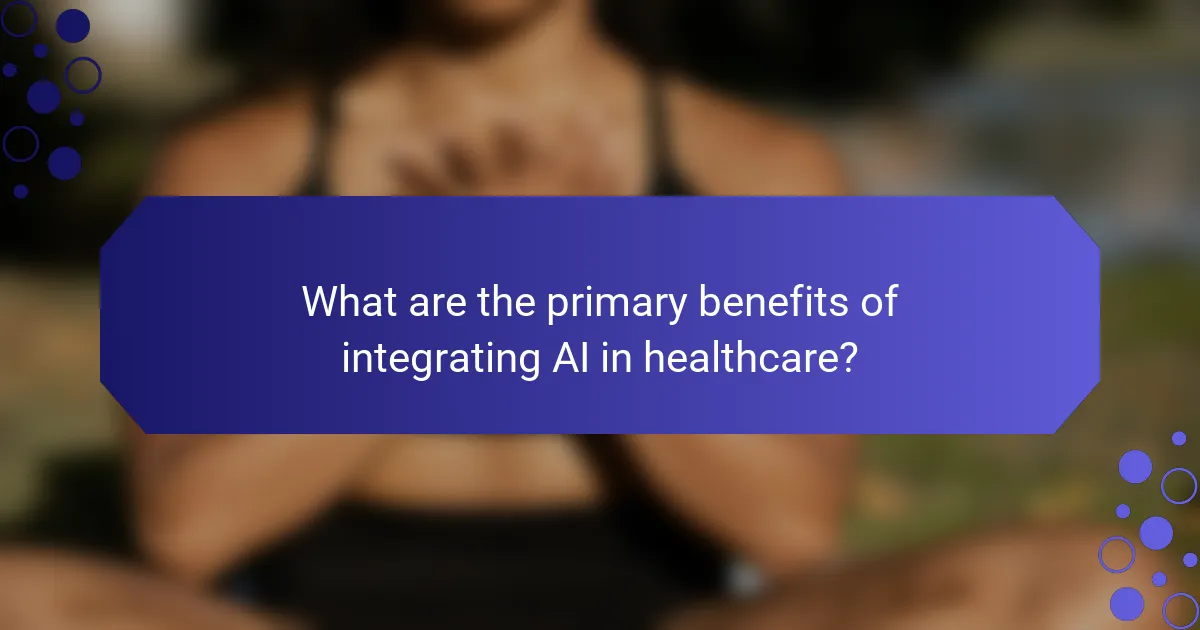
What are the primary benefits of integrating AI in healthcare?
Integrating AI in healthcare offers significant benefits, including improved diagnostic accuracy, enhanced patient care, and operational efficiency. AI algorithms analyse vast datasets, identifying patterns that aid in early disease detection. For instance, AI-driven imaging tools can detect anomalies in radiology images with high precision. Additionally, AI streamlines administrative tasks, reducing wait times and optimising resource allocation. As a result, healthcare providers can focus more on patient interaction, improving overall satisfaction and outcomes.
How does AI improve patient outcomes?
AI enhances patient outcomes by improving diagnostic accuracy, personalising treatment plans, and streamlining healthcare processes. For example, AI algorithms analyse medical data to identify patterns that may be overlooked by human practitioners. This leads to earlier detection of diseases and more effective interventions. Additionally, AI-driven tools assist in managing patient records, reducing administrative burdens, and allowing healthcare providers to focus more on patient care. As a result, patient satisfaction and health outcomes are significantly improved.
What cost-saving opportunities does AI provide for healthcare systems?
AI provides significant cost-saving opportunities for healthcare systems through automation and data analysis. By streamlining administrative tasks, AI reduces labour costs and enhances operational efficiency. Predictive analytics can optimise resource allocation, minimising waste. Additionally, AI-driven diagnostics improve accuracy, reducing unnecessary tests and treatments. These efficiencies lead to overall cost reductions while maintaining or improving patient care quality.
How can AI enhance operational efficiency in hospitals?
AI can significantly enhance operational efficiency in hospitals by automating administrative tasks, optimising resource allocation, and improving patient care. These improvements lead to reduced wait times and better health outcomes. For instance, AI algorithms can analyse patient data to predict admission rates, allowing hospitals to allocate staff and resources more effectively. Additionally, AI-powered chatbots can manage appointment scheduling, freeing up human staff for more complex tasks. As a result, hospitals can operate more efficiently while maintaining high-quality patient care.
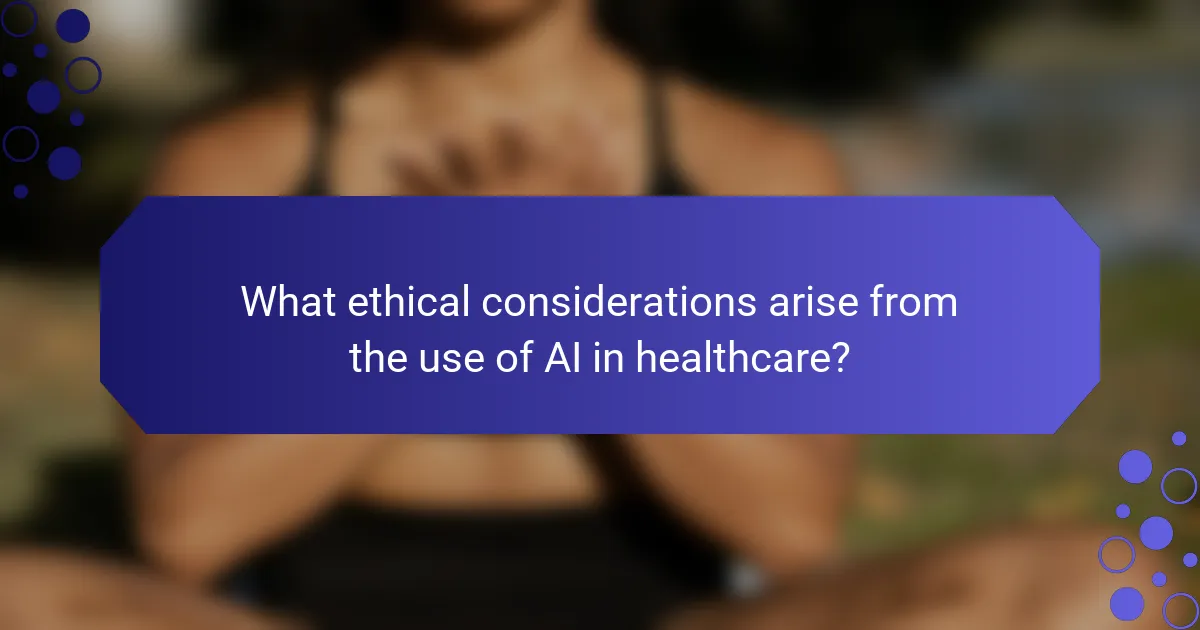
What ethical considerations arise from the use of AI in healthcare?
The use of AI in healthcare raises significant ethical considerations, including patient privacy, bias, and accountability. Ensuring data security is crucial as AI systems handle sensitive health information. Bias in algorithms can lead to unequal treatment outcomes, potentially affecting marginalised populations. Accountability for AI decisions remains unclear, complicating the assignment of responsibility in medical errors. Addressing these issues is essential for ethical AI integration in healthcare.
How does AI impact patient privacy and data security?
AI significantly impacts patient privacy and data security by enhancing data protection measures while also raising new ethical concerns. Advanced algorithms can analyse vast amounts of health data, identifying potential security threats and ensuring compliance with regulations like HIPAA. However, the integration of AI can lead to risks such as unauthorised access and data breaches if not properly managed.
Healthcare organisations must employ robust encryption methods and access controls to safeguard patient information. Continuous monitoring and auditing of AI systems are essential to detect vulnerabilities. Moreover, educating staff about data privacy practices is crucial in mitigating risks associated with AI adoption.
Balancing the benefits of AI with the need for stringent data security protocols remains a challenge. As AI technology evolves, healthcare entities must adapt their strategies to protect patient privacy while leveraging AI’s capabilities.
What are the implications of bias in AI algorithms?
Bias in AI algorithms can lead to unequal healthcare outcomes. It may result in misdiagnoses, ineffective treatments, and perpetuation of existing health disparities. These implications highlight the need for ethical oversight and diverse training data to ensure fairness and accuracy in AI applications. Addressing bias is crucial for building trust in AI systems and enhancing their effectiveness in healthcare settings.
How do regulations shape the deployment of AI in healthcare?
Regulations significantly influence the deployment of AI in healthcare by establishing standards for data privacy, safety, and efficacy. They ensure that AI applications comply with ethical guidelines and protect patient rights. Regulatory bodies like the FDA assess AI technologies for their impact on patient outcomes, which can affect market entry and innovation pace. As a result, adherence to regulations shapes the development and integration of AI solutions in clinical settings.
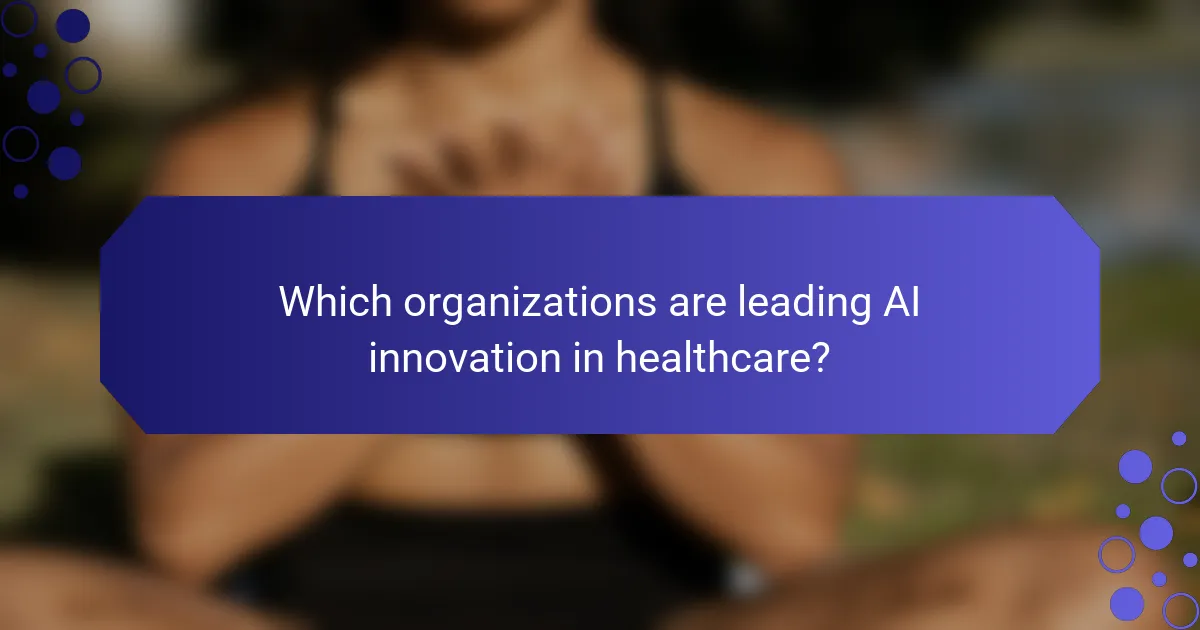
Which organizations are leading AI innovation in healthcare?
Leading organizations in AI innovation for healthcare include Google Health, IBM Watson Health, Microsoft Healthcare, Siemens Healthineers, and Philips Healthcare. These entities focus on enhancing diagnostics, treatment personalisation, and operational efficiency through advanced AI technologies. For instance, Google Health leverages AI to improve medical imaging analysis, while IBM Watson Health uses AI for data-driven decision-making in patient care. These innovations aim to transform healthcare delivery and patient outcomes significantly.
What initiatives are being taken by tech companies?
Tech companies are implementing various initiatives to enhance artificial intelligence in healthcare. These include developing AI algorithms for diagnostics, creating predictive analytics tools for patient outcomes, and integrating AI into telemedicine platforms. Companies are also focusing on ethical considerations, ensuring data privacy, and addressing bias in AI models. Collaborative efforts with healthcare providers aim to improve patient care and streamline operations, making AI a pivotal part of modern healthcare solutions.
How are healthcare providers collaborating with AI startups?
Healthcare providers are increasingly collaborating with AI startups to enhance patient care and operational efficiency. These partnerships leverage AI technologies for predictive analytics, personalised treatment plans, and streamlined administrative processes.
For example, AI startups provide tools that analyse patient data to identify trends and improve diagnostic accuracy. This collaboration fosters innovation, allowing healthcare providers to implement cutting-edge solutions that improve outcomes and reduce costs.
Additionally, ethical considerations are paramount in these partnerships. Both parties must ensure patient data privacy and adherence to regulations. As a result, the integration of AI in healthcare continues to evolve, driven by mutual benefits and shared goals.
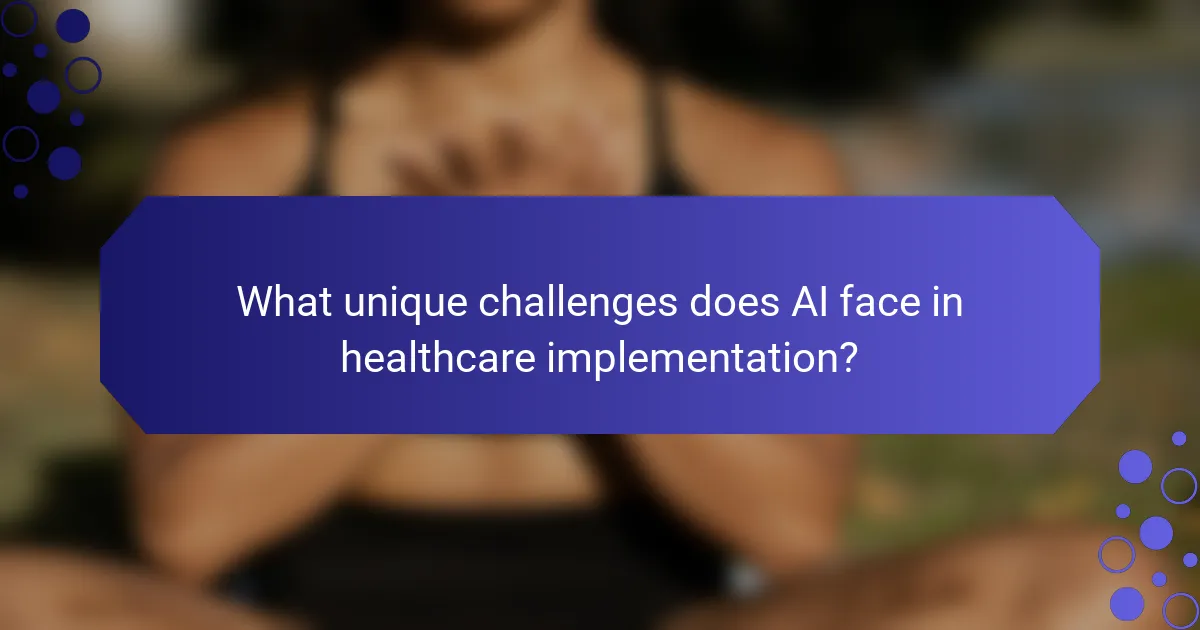
What unique challenges does AI face in healthcare implementation?
AI faces unique challenges in healthcare implementation, including data privacy concerns, integration with existing systems, and the need for transparency in decision-making. These challenges stem from the sensitive nature of health data and the complex regulatory environment.
Data privacy is paramount, as healthcare organizations must comply with regulations like HIPAA, which restrict access to personal health information. Integration poses difficulties, as AI systems must work seamlessly with legacy systems and various data formats. Additionally, the lack of transparency in AI algorithms can hinder trust among healthcare professionals and patients, impacting adoption rates.
Addressing these challenges requires collaboration among stakeholders, including technology developers, healthcare providers, and regulatory bodies. Solutions may involve developing standardised protocols, enhancing data security measures, and fostering open dialogue about AI’s role in healthcare.
How does the integration of AI affect healthcare professionals?
The integration of AI enhances healthcare professionals’ efficiency, accuracy, and decision-making. AI applications streamline administrative tasks, improve diagnostics, and personalise patient care. By automating routine processes, healthcare workers can focus on complex patient interactions. AI’s predictive analytics can identify health trends, leading to proactive interventions. Ethical considerations, such as data privacy and algorithmic bias, must be addressed to ensure trust in AI systems.
What technological barriers hinder AI adoption in healthcare?
Technological barriers hindering AI adoption in healthcare include data privacy concerns, interoperability issues, high costs, and a lack of skilled personnel. These challenges impede effective integration and limit the potential benefits of AI technologies. Data privacy regulations often restrict access to necessary patient data, while varying health IT systems hinder seamless data exchange. High implementation costs deter many healthcare organizations, and the shortage of trained professionals limits development and deployment. Addressing these barriers is crucial for maximising AI’s impact in healthcare.

What future trends can we expect in AI and healthcare by 2025?
By 2025, AI will enhance healthcare through personalised medicine, predictive analytics, and improved diagnostics. Emerging trends include AI-driven telemedicine, real-time patient monitoring, and automation of administrative tasks. These advancements will improve patient outcomes and efficiency while raising ethical considerations regarding data privacy and bias.
How will AI evolve in patient care and treatment protocols?
AI will significantly enhance patient care and treatment protocols through personalised medicine, predictive analytics, and improved diagnostics. AI algorithms analyse vast data sets to tailor treatment plans based on individual patient profiles. For example, AI can predict disease outbreaks by analysing trends in patient data, enabling proactive healthcare measures. Additionally, AI-powered diagnostic tools can identify conditions earlier than traditional methods, leading to timely interventions. Ethical considerations, such as data privacy and algorithmic bias, must be addressed to ensure responsible AI deployment in healthcare.
What advancements in AI technology are anticipated?
Advancements in AI technology are expected to enhance diagnostic accuracy, streamline administrative tasks, and improve patient outcomes. Innovations like machine learning algorithms will analyse medical data more efficiently. AI-driven tools may also support personalised medicine, tailoring treatments to individual patient profiles. Ethical considerations regarding data privacy and algorithmic bias will remain crucial as these technologies evolve.
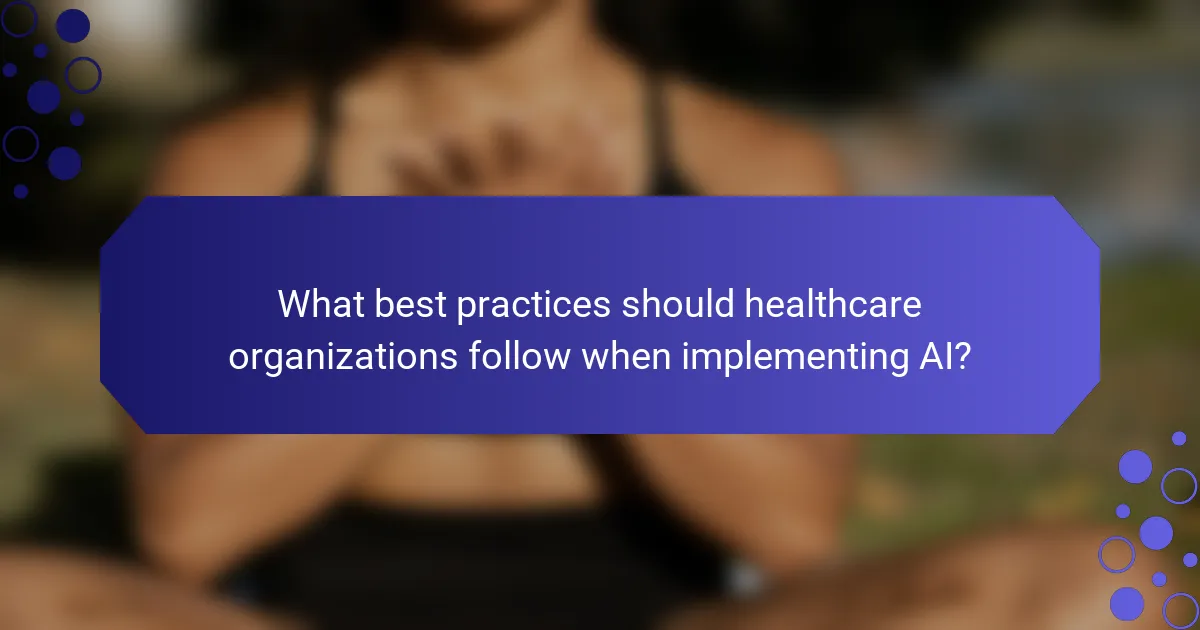
What best practices should healthcare organizations follow when implementing AI?
Healthcare organizations should prioritise transparency, data privacy, and continuous training when implementing AI. Establishing clear communication about AI capabilities builds trust among stakeholders. Ensuring robust data protection measures safeguards patient information. Regular training for staff enhances understanding and effective use of AI tools. Additionally, integrating ethical guidelines into AI development fosters responsible usage.
How can healthcare providers ensure ethical AI usage?
Healthcare providers can ensure ethical AI usage by implementing clear guidelines, promoting transparency, and prioritising patient privacy. Establishing ethical frameworks helps mitigate biases in AI algorithms. Continuous training for healthcare professionals on AI ethics is essential. Regular audits of AI systems can identify and address ethical concerns. Collaboration with ethicists and stakeholders enhances accountability and trust in AI applications.
What strategies can enhance AI integration into existing systems?
Integrating AI into existing healthcare systems requires strategic approaches to ensure effectiveness. Key strategies include fostering collaboration between IT and clinical staff, prioritising data interoperability, and implementing robust training programs.
Collaboration enhances understanding of clinical needs and technological capabilities, ensuring AI solutions are relevant. Data interoperability allows seamless sharing of information across systems, improving AI performance. Training programs equip healthcare professionals with necessary skills to leverage AI tools effectively, ultimately enhancing patient care and operational efficiency.
